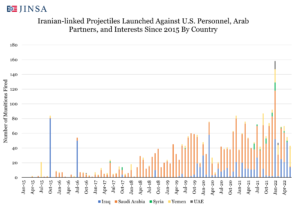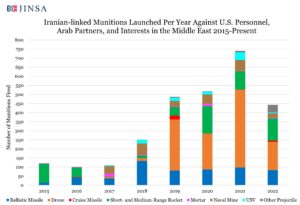Iran Summary – June 2022
About the Iran Summary: The Jewish Institute for National Security of America’s (JINSA) Gemunder Center produces a monthly tracker providing timely information and graphics illustrating Iran’s aggressive and destabilizing activities.
June 2022 Summary: While the brief resumption of nuclear talks failed to make progress, Iran escalated its enrichment program after the International Atomic Energy Agency (IAEA) passed a motion of censure against Tehran’s continued obstruction of inspectors. Iranian malign activity also accelerated, including in Turkey and Argentina, and the Iran-backed Houthi rebels in Yemen committed massive violations of the UN-brokered truce. Domestically, Iran stepped up its internet censorship, mass arrests, and executions in the face of growing popular discontent due to economic hardship and government corruption.
Response to Ukraine Crisis: Iran continued to exploit the Ukraine crisis for economic and political gain, ramping up its bilateral trade with sanction-ridden Russia and working to insulate the two bad actors from Western economic pressure. Iran also continued to blame NATO and America for Russia’s invasion.
- On June 23, while hosting Russian Foreign Minister Sergey Lavrov in Tehran, Iranian Foreign Minister Hossein Amir-Abdollahian reiterated Iran’s previous claim that America and NATO are responsible for the Russian invasion of Ukraine.
- In a meeting with Russian President Vladimir Putin on June 29, Iranian President Ebrahim Raisi stated that he hopes to further Iranian-Russian energy cooperation and to work together with Russia to create a financial system independent of the West in order to make it “impossible for any country to exert influence or pressure on it.”
Nuclear: Amid a motion of censure against Iran by the International Atomic Energy Agency (IAEA) and an unsuccessful attempt to revive talks in Qatar, Iran expanded its underground advanced centrifuge infrastructure, continued to flout its IAEA safeguards agreements and other nuclear transparency measures, and it sought to import prohibited dual-use materials.
- On June 6, Iran began installing a cascade of advanced IR-6 centrifuges at its deeply-buried Fordo enrichment plant, and alerted the IAEA of plans to build two additional cascades at its Natanz site.
- A German intelligence report on June 7 exposed Iran’s recent illicit efforts to procure dual-use supplies for its nuclear program.
- On June 8, Iran shut off IAEA monitoring devices at some of its nuclear sites following the passage of a censure motion against Iran by the IAEA Board of Governors.
- Iran began installing two additional IR-6 cascades at its underground Natanz nuclear site on June 8.
- On June 9, Iran removed 27 surveillance cameras from its nuclear sites, further handicapping the IAEA’s ability to monitor Iran’s nuclear activities.
- Iran announced on June 9 that it will begin accelerating the “production and installation” of its advanced centrifuges, such as the IR-2m, IR-4 and IR-6 in response to the IAEA’s censure motion.
- On June 20, the IAEA reported Iran had begun enrichment with its new IR-6 cascade at Fordo.
- On June 25, European Union foreign policy chief Josep Borrell met with Amir-Abdollahian in Tehran to try to broker a revival of the Iran nuclear talks.
- After a 16-week pause, U.S. and Iranian nuclear negotiators held two days of indirect talks in Doha. The negotiations ended inconclusively on June 29, the day after the session commenced, in the face of Iranian intransigence regarding maximalist demands, including the U.S. FTO delisting of Iran’s Islamic Revolutionary Guard Corps (IRGC) and sanctions relief on IRGC members.
Regional Aggression: As nuclear talks failed to restart, Iran ramped up its region-wide proxy campaign to destabilize the Middle East, including a massive escalation in truce violations by the Iran-backed Houthi rebels in Yemen, ballistic missile tests, and maritime aggression against U.S. naval vessels in the Strait of Hormuz. Iranian agents also attempted a (foiled) assassination campaign against Israelis in Turkey, as well as a foiled intelligence mission in Argentina.
- On June 6, the Yemen News Agency reported that the Iran-backed Houthi rebels had committed 464 breaches of the UN-led truce in Yemen in the first week of June alone, including significant troop deployments, multiple military assaults, and the indiscriminate laying of landmines across Yemen.
- An Iranian explosive drone detonated in Erbil, Iraqi Kurdistan on June 8 in an apparent attempt to target Mossad agents.
- On June 8, Argentine officials grounded a suspicious Venezuelan cargo plane with links to Iran and began investigating the plane’s Iranian crew members. An Argentine government official stated that they suspected the plane of intending to carry out intelligence operations in Argentina.
- Satellite images released by Maxar Technologies on June 15 suggested that Iran is preparing for a space launch.
- A video leaked on June 16 exposed the continued recruitment of child soldiers by the Houthis.
- On June 18, Yemen’s Defense Ministry reported that the Houthis had violated the UN-brokered truce 244 times between June 14 and June 16, killing four Yemeni soldiers and wounding 17.
- An IRGC speedboat acted in an “unsafe and unprofessional” manner near U.S. Navy patrol boats in the Strait of Hormuz on June 21.
- After the Israeli government previously advised Israeli citizens to avoid and leave Istanbul following Iranian threats toward Israeli tourists, on June 23 it was reported that Turkey had arrested several foreign nationals working for Iran who had been planning to kidnap or kill Israelis in Istanbul.
- On June 25, it was reported that the Iran-backed Hezbollah terrorist group had established 15 new observation posts along the Lebanese border with Israel.
- Iranian TV announced on June 26 the test launch of its satellite-carrying “Zuljanah” rocket—a move which could facilitate Iran’s development of an intercontinental ballistic missile (ICBM)—the day after Borrell traveled to Tehran to restart nuclear negotiations.


Cyber: Iran continued its global cyberterrorism campaign to extort illicit funds for its embattled regime and to destabilize and surveil its enemies. Iranian cyberterrorist groups targeted civilian infrastructure in Israel and Dubai, as well as hacking and impersonating emails accounts of Israeli public officials and attempting to steal documents from the United Nations Interim Force in Lebanon (UNIFIL). Additionally, it was revealed that Iranian-backed hackers were responsible for the summer 2021 cyberattack against Boston Children’s Hospital.
- FBI Director Christopher Wray released a statement on June 1 attributing last summer’s cyberattack on the Boston Children’s Hospital to Iranian-backed hackers.
- On June 9, a pro-Iranian cyberwarfare group claimed responsibility for recent attacks on the Tel Aviv Stock Exchange and the Dubai toll road system.
- On June 14, a cybersecurity firm revealed that Iranian hackers had infiltrated the emails of Israeli officials and impersonated at least some of those officials, including former Foreign Minister Tzipi Livni.
- Israeli Defense Minister Benny Gantz revealed on June 29 that Iran has tried to steal UNIFIL document through cyberattacks in coordination with Hezbollah.
- On June 31, Iranian hackers leaked the personal information of over 300,000 Israelis through attacks on travel booking websites.
Domestic/Human Rights: The Iranian regime continued to escalate its repression of the Iranian people amid continued nationwide anti-regime protests, including internet blackouts, pre-emptive arrests, and crackdowns on private online political speech. The regime also ramped up its utilization of mass executions plus arrests of tourists and religious minorities in an attempt to curb popular dissent and alleged foreign infiltration.
- On June 4, the Iranian government disrupted internet service across Iran in order to prevent Iranians from organizing and communicating through social media amidst the growing wave of popular protests.
- Iranian security forces arrested at least 10 teachers across Iran’s western Kurdish provinces on June 14 ahead of planned nationwide teacher protests.
- On June 16, the IRGC arrested three admins on the social media app Telegram for “agitating public opinion.”
- On June 19, Iranian state-run media reported that Iranian security forces had arrested 120 tourists in northern Iran for immoral actions, including mixed-gender dancing and women taking off their hijabs.
- Iranian security forces arrested 22 tourists in northern Iran on June 26 for allegedly “propagating an emerging Western sect.”
- On June 22, Iranian security forces detained two minority Bahai women in Shiraz and took them to an undisclosed location.
- According to a report from Radio Free Europe/Radio Liberty, as of June 28, Iran had executed 239 people so far in 2022.
- On June 29, Iran executed 10 individuals, including a gay executed for alleged sodomy.
- On June 29, a French citizen was sentenced to an 8-year-and-8-month prison sentence on espionage charges that he has continually denied.
Recent JINSA Publications on Iran:
- June 3: “Don’t Look Now, but Biden’s Iran Policy Is Still Failing,” Michael Makovsky, PhD and John Hannah, National Review
- June 8: “Enough of the ‘Tenuous’ Iran Nuclear Deal—It’s Time for Plan B,” Amb. Eric Edelman and Gen Charles “Chuck” Wald, USAF (ret.), The Hill
- June 22: “Congress Should Reclaim Its Say on Iran Policy,” Gabriel Noronha, The Hill
- June 23: “Tanker Troubles: America Needs a Plan B Iran Strategy,” VADM Herman A. Shelanski, USN (ret.), Ari Cicurel, and Andrew Ghalili, The National Interest
Recent JINSA Iran Nuclear Talks Updates: